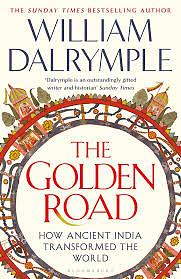You need to sign in or sign up before continuing.
Take a photo of a barcode or cover
challenging
informative
reflective
slow-paced
informative
slow-paced
informative
Dalrymple stated aim in this book is to revive an understanding of how significant India has been as a global power, especially east towards Arabia, North Africa and Europe, and west towards South-East Asia. This is largely achieved through his coverage of the development and spread of Buddhism and Hinduism, with a bit of Sanskrit, and the significance of numeral notation.
The book is interesting, but perhaps because I didn't come in unconvinced, I wasn't entirely sold on the structure. I found myself wanting to read more specific books on those specific things - especially the religions, where the rapid cultural conversion is fascinating, but I'm not sure coming out I entirely understand why.
I have come out with a new list of places I really, really want to visit though, so that was totally worth it.
The book is interesting, but perhaps because I didn't come in unconvinced, I wasn't entirely sold on the structure. I found myself wanting to read more specific books on those specific things - especially the religions, where the rapid cultural conversion is fascinating, but I'm not sure coming out I entirely understand why.
I have come out with a new list of places I really, really want to visit though, so that was totally worth it.
challenging
informative
inspiring
reflective
medium-paced
informative
inspiring
medium-paced
challenging
informative
reflective
slow-paced
There are two kinds of history books. The first is about how someone did everything. The second is about how no one did nothing. This book is in the first category.
The author advances the idea of the 'Indosphere.' From antiquity to the Middle Ages, India was influential globally. The influence here is economic, scientific, and religious. India was a major trading partner to Rome, and after Rome diminished India turned that same economic engine towards nations in Southeast Asia. Buddhism, founded in India, is a major religion for China and other Southesast Asian nations, not just affecting culture but also history and politics. Sometimes Hinduism, usually in a Buddhist amalgamation, also spread. Finally, Indian math would be the basis of modern math in general, specifically through its spread to Persia and Iraq and then on through the Italian city-states to the world.
The reason the story is not already told this way is the ethnocentric projects of other nations, specifically Germany and China. They had (and in China's case, have) an interest in minimizing Indian contributions in the interest of their own. The examples is the Silk Road, which really was not a thing. The Silk Road is somewhat like calling the diner at the corner 'the farming place,' ignoring the instrumentality of the project for the particular ends that serve your own ego.
In general, the book has two problems. The first is the sort of project in general. Golden Ages or Pax Whomever-as are wobbly concepts in general, and are more of a referendum on what sorts of values you have rather than what is going on. The book is not about an Indosphere except in its relationship with other cultures using their intellectual product. You can look at that as about cultural domination, but it seems to me more like proof of the intractable connection of nations and the way in which that every culture only exists in relationship to other ones. Globalism is a social and economic constant. It only becomes a relevant concept after it is lost through more protectionist or mercantilist projects.
The odd bit is that the closest the book comes to a specifically Indian cultural hegemony is, curiously, in some of its least externally influential parts. The bits on art and drama are unique.
The second problem is what history is chosen here. Even under the assumption that we can isolate out a unique Indosphere, the selection here feels arbitrary. They are good stories. The author writes excellent narrative history. But it seems like the tail is wagging the dog in taking these bits of Roman, Chinese, Khmer, Iraqi, et cetera history and converting it to a history about India. I am uncertain that I know what evidence that I would expect to prove the point, but there is nothing about this as a list of topics that is uniquely persuasive.
So fun topic, interesting detail, but insubstantial.
Thanks to the author, William Dalrymple, for writing the book, and to the publisher, Bloomsbury, for making the ARC available to me.
The author advances the idea of the 'Indosphere.' From antiquity to the Middle Ages, India was influential globally. The influence here is economic, scientific, and religious. India was a major trading partner to Rome, and after Rome diminished India turned that same economic engine towards nations in Southeast Asia. Buddhism, founded in India, is a major religion for China and other Southesast Asian nations, not just affecting culture but also history and politics. Sometimes Hinduism, usually in a Buddhist amalgamation, also spread. Finally, Indian math would be the basis of modern math in general, specifically through its spread to Persia and Iraq and then on through the Italian city-states to the world.
The reason the story is not already told this way is the ethnocentric projects of other nations, specifically Germany and China. They had (and in China's case, have) an interest in minimizing Indian contributions in the interest of their own. The examples is the Silk Road, which really was not a thing. The Silk Road is somewhat like calling the diner at the corner 'the farming place,' ignoring the instrumentality of the project for the particular ends that serve your own ego.
In general, the book has two problems. The first is the sort of project in general. Golden Ages or Pax Whomever-as are wobbly concepts in general, and are more of a referendum on what sorts of values you have rather than what is going on. The book is not about an Indosphere except in its relationship with other cultures using their intellectual product. You can look at that as about cultural domination, but it seems to me more like proof of the intractable connection of nations and the way in which that every culture only exists in relationship to other ones. Globalism is a social and economic constant. It only becomes a relevant concept after it is lost through more protectionist or mercantilist projects.
The odd bit is that the closest the book comes to a specifically Indian cultural hegemony is, curiously, in some of its least externally influential parts. The bits on art and drama are unique.
The second problem is what history is chosen here. Even under the assumption that we can isolate out a unique Indosphere, the selection here feels arbitrary. They are good stories. The author writes excellent narrative history. But it seems like the tail is wagging the dog in taking these bits of Roman, Chinese, Khmer, Iraqi, et cetera history and converting it to a history about India. I am uncertain that I know what evidence that I would expect to prove the point, but there is nothing about this as a list of topics that is uniquely persuasive.
So fun topic, interesting detail, but insubstantial.
Thanks to the author, William Dalrymple, for writing the book, and to the publisher, Bloomsbury, for making the ARC available to me.
informative
medium-paced
hopeful
informative
inspiring
slow-paced
adventurous
informative
slow-paced



